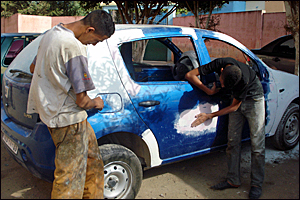2010-06-16
Advocacy groups and working children are contesting government claims that child labour rates have fallen.

[Naoufel Cherkaoui] Poverty forces many Moroccan families to send their children to work under tough conditions at an early age. |
To mark World Day against Child Labour, Morocco's High Commission for Planning (HCP) released a study claiming that the number of working children aged 7 to 15 hovers around 171,000.
According to the HCP report, released Sunday (June 12th), rural children account for 210,000 of the under-age workers. Among working children, 16.6% work while attending school, 56.1% have left school to work and 27.3% have never set foot in a classroom. An overwhelming number (93.5%) of child labourers work in agriculture, tree-cutting and fishing.
The study says the new figures represent a 9.7% drop from 1999 child labour rates.
Many Moroccans see a very different reality.
Houcine, 14, toils in a car repair garage to help his family with the cost of living, he told Magharebia.
"That was the main reason why I had to drop out of school. Plus, I could not catch up since some of the subjects were rather tough, such as mathematics," he said.
Mourad, a seasonal agricultural worker from Tensift-El Haouz, said his two children have to work.
"I don't have any other solutions," he said. "If they don't work, they often wouldn't have enough to eat, because I'm unemployed. I would have loved for them to be in school, so they could be assured of a better future than I had."
His son Hamza, with tears in his eyes, said he would have liked to become a doctor, but he had to leave school five years ago.
"I never had the opportunity to go after my dream. I didn't even have the chance to play with other children my age," he said. "At the same time, I feel responsible for my family."
"The rates released by the HCP are inaccurate because their methodology...is totally unrealistic. It's enough to walk by marginalised districts to spot the enormous numbers of working children," said Abdelali Rami, who heads the children's rights organisation Forum de l'Enfance.
"The reality of child labour does not live up to our expectations, since they are still living under tough conditions on account of poverty, which is why they drop out of school," Rami said.
"The problem can't be solved without providing reasonable living conditions for parents of those children," he added. "The answer doesn't lie in passing laws, but in ensuring they are applied."
Children's rights groups launched their own campaigns on June 12th to call attention to the problem.
The Collective for the Eradication of Child Labour collected signatures on a petition calling for the abolition of under-age maids and other household servants.
"This initiative aims to break the silence of [this phenomenon]… and create a legal framework that conforms to international law and conventions adopted by Morocco," said organiser Meriem Kamal, adding that 60,000 girls under the age of 16 serve as domestic help in Morocco.
The National Observatory of Children's Rights (ONDE) also spotlighted children working on the domestic front and launched the third stage of its campaign against child labour.
"The first was devoted to the need to treat children well, the second targeted parents, intermediaries and employers, and the third [stage] that we just launched is intended to put an end to the phenomenon," said ONDE executive director Said Raji. |


